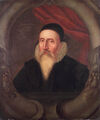Template:Selected anniversaries/July 13: Difference between revisions
No edit summary |
No edit summary |
||
| Line 13: | Line 13: | ||
||1831: Arthur Böttcher born ... pathologist and anatomist. | ||1831: Arthur Böttcher born ... pathologist and anatomist. | ||
||1854: Aristarkh Apollonovich Belopolsky born ... Russian astronomer. Pic: https://ipfs.io/ipfs/QmXoypizjW3WknFiJnKLwHCnL72vedxjQkDDP1mXWo6uco/wiki/Aristarkh_Apollonovich_Belopolsky.html | |||
||1857: Karl Wilhelm Gottlob Kastner dies ... chemist, natural scientist and a professor of physics and chemistry. | ||1857: Karl Wilhelm Gottlob Kastner dies ... chemist, natural scientist and a professor of physics and chemistry. | ||
Revision as of 13:54, 10 October 2018
100 BC: Roman general and statesman Julius Caesar born. He will play a critical role in the events that led to the demise of the Roman Republic and the rise of the Roman Empire.
1527: Mathematician, astronomer, and astrologer John Dee born. He will achieve high status as a scholar and play a role in Elizabethan politics.
1956 – John McCarthy (Dartmouth College), Marvin Minsky (MIT), Claude Shannon (Bell Labs), and Nathaniel Rochester (IBM) assemble the first coordinated research meeting on the topic of "Artificial intelligence" at Dartmouth College in Hanover, NH. USA.
1972: Signed first edition of Skip Digits, Conductor sells for one million dollars; House Democrats say money trail leads to Richard Nixon.
1973: Watergate scandal (nonfiction): Alexander Butterfield reveals the existence of the "Nixon tapes" to the special Senate committee investigating the Watergate break-in.
1974: Mathematician and crime-fighter Hilary Putnam publishes his landmark paper arguing that mathematics is not purely logical, but "quasi-empirical", and that we should beware the possibility of "quasi-empirical crimes".
2015: Steganographic analysis of Blue City Sunset reveals "five hundred kilobytes, perhaps six hundred" of previously unknown Gnomon algorithm functions.






